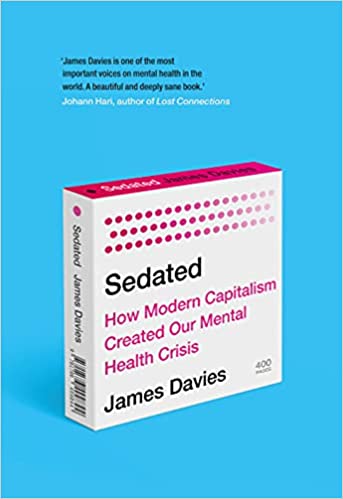Sedated
Full Title: Sedated: How Modern Capitalism Created our Mental Health
Author / Editor: James Davies
Publisher: Atlantic Books, 2021
Review © Metapsychology Vol. 25, No. 30
Reviewer: Duncan Double
This is a well-written book. As in his previous book, Cracked, the author, James Davies, Reader in Medical Anthropology and Mental Health at the University of Roehampton, builds the narrative in each chapter round interviews with various experts.
In this case his topic is how society understands and treats mental illness. His primary motivation is to move psychiatry on from what he sees as its misguided individualistic perspective. Marketing of mental health since the 1980s has tended to blame faulty minds and brains rather than harmful social, political and work environments. He relates this perspective to the Thatcher/Reagan revolution in capitalist economics that believed that social democracy had been tried and failed. He also discusses the impact of a rise of a target culture and managerialism in health and education, as the new Labour government built on the Thatcherite market reforms to change governance of public sector institutions.
James calls the championing of these virtues of free markets, privatisation and deregulation the mainstays of neo-liberalism. I’m not convinced that Margaret Thatcher’s individualism based on encouraging achievement and effort welcomes people asking for help from mental health services. Thatcher would probably have preferred them to pull themselves up ‘by their own bootstraps’. In this sense, I guess neo-liberalism can’t be blamed for the massive increase in psychotropic prescribing and disability benefits over recent years. True, the Improving Access to Psychological Therapies (IAPT) programme was funded on the basis that it would get people back to work. Yet, if that’s the aim of psychiatric treatment, it’s not apparently been very successful and instead has encouraged a dependency amongst patients. Telling people that they only have themselves to blame for their mental health problems may actually be counter-productive.
James argues that the ideology of the political economy since the 1980s has propped up mental health care rather than examine structural explanations that might challenge the status quo. He recognises that aligning mental health services with new capitalism was “never purposely plotted behind the scenes” (p. 333). However, such services have been marketed in political enticing ways, despite providing poor outcomes. In the end, James advocates for fundamentally progressive and socially democratic arrangements to change the economy to create the basis for reform of mental health services.
This book is designed for the general public and on this level it succeeds. Its academic argument could be more refined and there is, of course, a question about how much the critique of biomedical dominance in psychiatry, of which this book is a part, can change psychiatry. As the book demonstrates, the current economic model of biomedical psychiatry has been remarkably successful. The problem is that medicine in general, of which psychiatry is a part, has always exploited patients, not just since the 1980s. True, the psychopharmacological revolution since the 1950/60s has led to unethical practices. And the development of IAPT has also unrealistically been seen as a panacea for mental health problems. However, in a way, there’s nothing new about so-called neo-liberalism which changes the longstanding reductionism and positivism of psychiatry. I’m not saying managerialism and the over-emphasis on ‘risk’ have not damaged mental health services. But, modern psychiatry and medicine in general tend to overemphasise physical disease at the expense of its psychosocial context. This problem is particularly acute for psychiatry which does not have biological markers of primary mental illness. Doctors are inclined to treat patients as objects rather than people when seen as faulty machines, whether it’s their minds or brains which are seen as broken.
Nonetheless, this book can be recommended as an engaging, undemanding, agreeable account of the dilemmas of mental health work. Its analysis and evaluation of the issues contribute to the necessary critique of psychiatry.
Duncan Double is a retired consultant psychiatrist. He blogs on critical psychiatry at http://criticalpsychiatry.blogspot.com.
Categories: General
Keywords: capitalism, psychiatry

